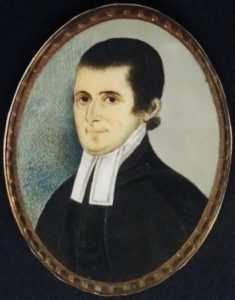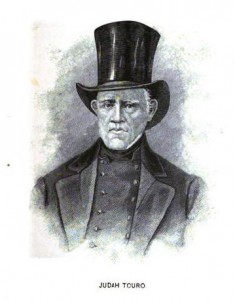
Gershom Mendes Seixas
Antonio Abraham Mendes Seixas (d. 1738) was born in a small village in Portugal to a family of Conversos (or Marranos), Jews who had been forcibly converted to Christianity but continued to practice their ancestral faith in secret. The Seixas family was made up of physicians, lawyers, and merchants, and were among the most successful in Portugal. Despite this, they were still hounded by the Inquisition, and many were imprisoned or put to death. Abraham Mendes Seixas himself barely escaped the Inquisition, and settled in London with his wife and three kids around 1725. There, the family openly returned to Judaism, and Seixas renewed his marriage vows under a proper chupah in a public ceremony. Seixas quickly rebuilt his wealth and became a prominent member of London’s growing Sephardic community. When he passed away in 1738 he left very little for his only son, Isaac Mendes Seixas (b. 1709) apparently believing he was unfit to run the business. Isaac set forth for a new start in America. The son proved a good businessman, and quickly rose to the highest ranks of the merchant class in the New World. He married Rachel Levy, daughter of the great (former Jew of the Week) Moses Levy, and became an important member of Shearith Israel, one of America’s first synagogues.
Isaac’s son, Gershom Mendes Seixas (1745-1816) was the hazzan of that synagogue, and although not ordained for the role, served as its rabbi. Some say he may have been the first rabbi born in America, while others point out he was the first rabbi to give sermons in English. He was also the first Jew to sit on the board of an American university (Columbia). His good friend of twenty years, and fellow on Columbia’s board, was Alexander Hamilton, one of the Founding Fathers of the United States. It is quite likely that Gershom helped Hamilton in drafting and promoting some of the famous Federalist Papers. Meanwhile, Gershom’s older brother Moses Mendes Seixas (1744-1809) moved to Newport and became one of its richest businessmen. He co-founded the Bank of Rhode Island, and served as president of Touro Synagogue, America’s first (and also to whom George Washington wrote one of his most well-known letters). Meanwhile, younger brother Benjamin Mendes Seixas (1748-1817) was one of the founders of the New York Stock Exchange, and youngest brother Abraham Mendes Seixas (1751-1799) was a decorated officer in the Continental Army during the American Revolution. The entire family was known for their tremendous patriotism and philanthropy.
Did You Know These People Are Jewish, Too?
Words of the Week
For happily the Government of the United States gives to bigotry no sanction, to persecution no assistance, requires only that they who live under its protection should demean themselves as good citizens, in giving it on all occasions their effectual support.
– George Washington, in his 1790 letter to the Touro Synagogue and the Jewish community of Newport.

